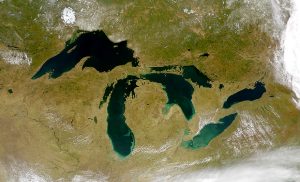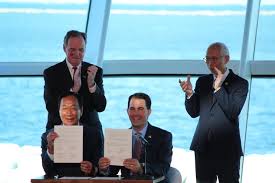Foxconn Water Diversion Approval to be Tested in Administrative Hearing; Judicial Review to Follow?
In recent years, it has become relatively common knowledge that the Great Lakes Compact generally bans diversions of Great Lakes water outside the Great Lakes basin but offers limited exceptions. A community that straddles the basin line, or that lies within a county that straddles the basin line, may  apply for a diversion subject to certain stringent technical conditions. I have previously written in this space that the Compact has been successful at least insofar as the party states were able to agree on and subsequently enforce a common decision-making process to consider such requests. In October 2018, Compact supporters will celebrate its 10-year anniversary.
apply for a diversion subject to certain stringent technical conditions. I have previously written in this space that the Compact has been successful at least insofar as the party states were able to agree on and subsequently enforce a common decision-making process to consider such requests. In October 2018, Compact supporters will celebrate its 10-year anniversary.
But the Compact’s first decade has not passed without controversy, much of it centered on the diversion provisions generally and on southeastern Wisconsin in particular. In fact, during a recent conference keynote address here at the Law School’s Lubar Center, Compact expert Peter Annin noted that our area has more “diversion hotspots” than the other Compact party states combined. Consider that in 2009, the City of New Berlin (a straddling community) became the first community to successfully apply for a diversion, and in 2016, the City of Waukesha became the first community within a straddling county to successfully apply for a diversion.
Just last week, the region made Compact history for yet another reason. For the first time, opponents to an approved diversion have filed a legal action to challenge the approval in a state administrative hearing, potentially as a precursor to an appeal to Wisconsin circuit court. The proceedings to follow will provide important and novel insights on how to interpret the Compact.


 ion people. Meanwhile, the Law School, working in partnership with the Milwaukee Journal Sentinel, has taken an increasing role and interest in studying various aspects of the “Chicago Megacity,” the region stretching from the Milwaukee area, across metropolitan Chicago, and into northwest Indiana. For example, see
ion people. Meanwhile, the Law School, working in partnership with the Milwaukee Journal Sentinel, has taken an increasing role and interest in studying various aspects of the “Chicago Megacity,” the region stretching from the Milwaukee area, across metropolitan Chicago, and into northwest Indiana. For example, see